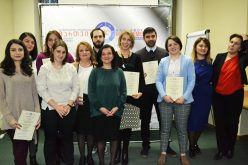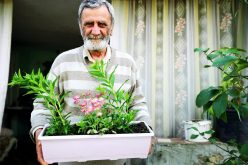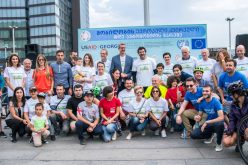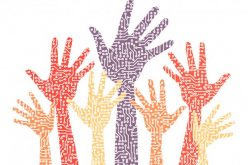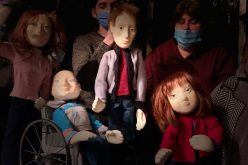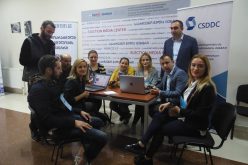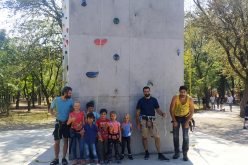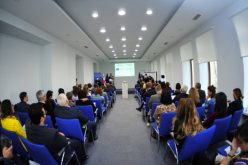Non-violent civic activism training empowers Georgian activists to make a greater impact in their communities

“Movements are about working to instill certain values in society. While they can often be driven by frustration and negative energy, a successful movement must translate into positive change. They are about knowing more than just what you stand against – you need to know what you stand for.” –Slobodan Djinovic, Chair of the Belgrade-based Center for Applied Nonviolent Actions and Strategies (CANVAS)
This advice from Slobodan Djinovic, who was a founding member of the Otpor! (“Resistance!”) movement that played a crucial role in bringing down the Milosevic regime in Serbia, was just one of the valuable insights imparted on Georgian civic activists at a recent training in Tbilisi.
The training, which was supported by the USAID Civil Society Engagement program and implemented by CANVAS, brought together 20 emerging and experienced activists from various regions of Georgia for five days to participate in interactive sessions focused on forms of non-violent civic activism.
 From September 26 – 30, 2022, activists, whose work focuses on a spectrum of issues, including community development, environmental issues, children’s rights, access to quality education, and minority rights, participated in discussions and exercises focused on defining a vision of tomorrow, choosing tactics of nonviolent action, and creating effective branding and communication strategies.
From September 26 – 30, 2022, activists, whose work focuses on a spectrum of issues, including community development, environmental issues, children’s rights, access to quality education, and minority rights, participated in discussions and exercises focused on defining a vision of tomorrow, choosing tactics of nonviolent action, and creating effective branding and communication strategies.
Participant Roland Baghaturia, who works in the NGO Active Civic Initiative to encourage citizen participation in decision-making processes in the Samegrelo region, says that the training better prepared him to approach activism in a more sustainable manner. “This training has emphasized the importance of a long-term strategy. When you want to make a change in society, you need to be more than just reactive, which is something I think many activists struggle with. Strategy, planning, and unity among stakeholders are all essential in creating a successful movement.”
For urban activist Marina Meskhi, participation in the training meant gaining new skills and tools at a time when she felt that she had exhausted all possible remedies for addressing issues in her community.
“I live in the Vashlijvari neighborhood in Tbilisi, which, thanks to unregulated real estate development, is suffering from major traffic jams and a lack of reliable public transport,” says Meskhi. “Before the training, I had already written to Tbilisi City Hall and the transport agency but felt very discouraged by the lack of results I had seen. Following this training and the detailed feedback that our trainer Sinisa provided, I have created a new plan and have already begun working to mobilize my community around it.”
In addition to gaining new skills and receiving valuable feedback from CANVAS experts on their activism plans, participants of the training also had the opportunity to network with other activists and explore possible areas of future cooperation and support.
Ayhan Həsənov, who co-founded the Platform Salam movement that focuses on protecting minority rights in the Kvemo Kartli region, says that he has already seen the benefits of connections made with other activists.
“This past week, our movement held a rally in front of the Georgian parliament to raise attention about the deteriorating infrastructure of ethnic minority schools in Kvemo Kartli,” he says. “I spoke to some of my fellow trainees about it and was very pleased that they decided to join the rally and stand beside us.”
Beyond the connections made and skills learned during the week, CANVAS will continue to support the participants as they put their training to work in their own areas of activism. In the coming months, CANVAS will hold at least 12 targeted e-training and e-mentoring sessions with individual participants to advise and guide them in implementing their own action plans and initiatives.
Training participants will also have the opportunity to apply for the USAID Civil Society Engagement Program’s grant programs. Meskhi says that after the training, she feels better equipped to apply for a grant that will help her improve her community. “Based on my meetings with the CANVAS staff during the training and after hearing their feedback, I have already begun to prepare my project. I feel confident applying for a grant now that I have created a concrete strategy.”
Following a previous CANVAS training for activists in April 2022, three participants successfully secured grants to help bring their initiatives to fruition. These include a theater project in Dmanisi (Kvemo Kartli) that aims to use art to encourage open discussion about social issues, a public movement to protect the rights of residents in the manganese mining town of Chiatura (Imereti), and a project that aims to protect and empower cultural workers in Georgia by raising awareness of their legal rights.
The previous cohort has also utilized the networking opportunities they were given to forge partnerships that have gone far beyond a week spent together in Tbilisi. Aitaj Khalili, who is a member of Platform Salam, recently teamed up with fellow participant Nodar Chachanidze, who founded the movement “Future Chiatura” and hosts the TV Formula show “Voice of the Regions,” to advocate for the rights of residents in their respective towns of Bolnisi and Chiatura. Together, Halili and Chachanidze are raising awareness and giving voices to residents who are negatively impacted by companies that extract natural resources in a way that harms the local environment. Platform Salam has also invited two training participants, Giga Bekauri and Lasha Chkhvimiani, who both work on defending labor rights in the culture sector, to deliver trainings to its members on social justice, dignified work, and civic activism in the arts.



